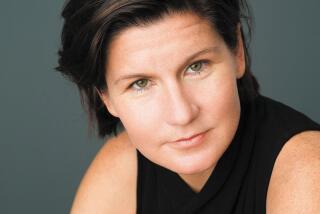Book Review : A Stepmother’s Lot on a Lonely Farm
- Share via
The Life of Helen Alone by Karen Lawrence (Villard Books: $15.95)
Speeding in record time from phenomenon through trend to inescapable fact, the instant family has become a mainstay of current fiction. Novels haven’t included so many stepparents since the early 18th Century, when most marriages ended with the death of a spouse after about 15 years. Now that divorce reconstitutes families just as dramatically and even more frequently, stepmothers and stepfathers are back in literary fashion, and from all indications, here to stay. The social conditions that gave us “Nicholas Nickleby,” “Barchester Towers” and “Pride and Prejudice” have returned, producing a spate of novels with contemporary variations on classic domestic conflicts. Neither derivative nor stereotypical, “The Life of Helen Alone” is particularly relevant to the way people live now.
Unwed Stepmother
Helen and Daniel are Canadians, homesteading on an isolated farm on the Western plains. Though they’re not married, Helen is a stepmother anyway, with responsibility for the three children of her lover’s first marriage; 8-year-old Jenny, who continually reminds her that “You’re not my mother, you know”; Hawkins, l3 and “a fierce introvert,” and 15-year-old Travis, a precocious charmer, appealing and manipulative. Though even under the best possible circumstances Helen’s situation would be precarious, the harsh environment exacerbates the difficulties. She’s constantly on trial, and no one ever lets her forget it. “Helen looks at the land where she lives. It is male. Flat . . . Places where there is a promise of a hill, of roundness, stop suddenly, jagged at the top, the far side fallen away into rubble as if the mound has been hacked. Rock inside after all . . . A woman has to fight to live here . . . Men do well--the bars and oil rigs and hayfields are full of them, chugging and drilling and hammering away.”
Trained as a psychologist, brought up in Montreal, Helen wasn’t born, bred or educated for the rigorous life she’s impulsively embraced. For that matter, neither was Daniel, who originally bought the farm with the idea of starting a commune, an experiment lasting three years before the others drifted away to more accessible Utopias. He stayed “because he was stubborn and powerful, hard to uproot once he had planted himself;” useful traits for a prairie farmer and precisely the qualities Helen had missed in other relationships. Like other women in her anomalous position, she doesn’t allow herself to dwell on the reasons Daniel’s first wife abandoned him and the children. Helen will work harder, be more loving and forgiving, make herself indispensable. As the group therapist who helped Daniel come to terms with his divorce, she imagines she understands his needs better than anyone else--and perhaps she does. What she doesn’t comprehend is her own.
Heightened Tensions
When Helen’s feckless brother Eddie comes for an extended visit, the tensions escalate. Eddie is a lovable loser, inept at all the skills Daniel has necessarily acquired. Eddie lives to have fun, moving on whenever he’s threatened by commitment to a career, a woman or a place. Despite these fundamental differences of character, the men establish an easy rapport, merely because they’re men. Eddie, who was to have been Helen’s bulwark against the brutal climate, the casual cruelties of the children; her buffer between the old life and this strange new one, quickly becomes another mouth to feed, more clothes to wash, an added responsibility. The companionship she’d expected from this visit never quite materializes. “Eddie was a man, like all the other men--Daniel, Hawk and Travis. She could feel what it was like to be him, to be a man. And it felt to her like nothing so much as having your heart in a box.” Instead of mitigating Helen’s loneliness, Eddie’s presence aggravates it.
If these sentiments sound disturbingly misanthropic, they’re merely realistic. The endless backbreaking work of the farm heightens the differences between men and women, forcing the characters into traditional roles, leaving them no choice. Helen is left to nurture and cope; the man are busy with other projects. The farm wins out despite Helen’s most strenuous efforts; despite Daniel’s genuine desire to see her happy.
Because Karen Lawrence is a superior nature writer, lyrical even when she is describing the most grueling aspects of the implacable landscape, the setting functions as the strongest force in the book, more powerful than the will of the characters, the physical passion between Helen and Daniel, or the various kinds of love and loss the author confronts. Ultimately, nature triumphs even over plot, lending unusual vitality and destruction to a family melodrama.
More to Read
Sign up for our Book Club newsletter
Get the latest news, events and more from the Los Angeles Times Book Club, and help us get L.A. reading and talking.
You may occasionally receive promotional content from the Los Angeles Times.










